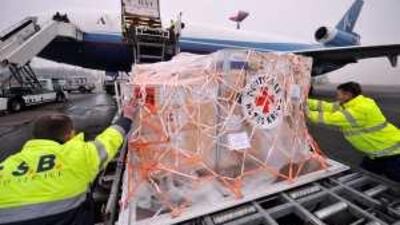HARARE // Zimbabwe and the European Union plan to begin formal talks this month in Brussels in an effort to mend broken relations and end a crippling regime of sanctions, according to officials in Harare. The dialogue should have started last month, but was postponed because ministers could not fly to Brussels amid the ash cloud from an Icelandic volcano.
Patrick Chinamasa, the justice minister and a member of the delegation, said his team is discussing with the EU a new date for the meeting. Sources in the ministry of foreign affairs said preliminary indications are that it will be held this month. "The talks are urgent. I don't have the exact date but I am told it will be late May," the source said. Like most Zimbabweans, Eldred Masunungure, a political-science professor at the University of Zimbabwe in Harare, hoped the bilateral talks will succeed, so EU sanctions on Zimbabwe can be lifted. The lifting of sanctions, he said, could result in the normalisation of relations between the country and the wider international community.
"This is the beginning," said Mr Masunungure, "in terms of changing the mindset so that in the next couple of months when the EU sits to review the sanctions in February next year, we might see the lifting of some measures." Discord between Zimbabwe and the EU started in 2000 when Robert Mugabe, the Zimbabwean president, launched a scheme to seize white-owned farms to resettle poor blacks. The Europeans also accused Mr Mugabe of human rights abuses. In 2002, the EU imposed sanctions, under which Mr Mugabe and about 100 of his closest political and business associates are banned from travelling to the group's 27 member countries. Assets held in the EU by figures on the sanctions list were also frozen. Trade restrictions were imposed on some companies while budgetary support and projects were halted.
Humanitarian assistance was not affected. Isolated economically and diplomatically from its biggest trading partner, Zimbabwe's economy nearly collapsed and showed signs of stabilising only last year, when Mr Mugabe formed a unity government with his former rivals. Many Zimbabweans are desperate for the dialogue to succeed and unlock economic support from the EU to boost economic reconstruction. "No country is an island," said Natalie Khupe, 28, a human resources practitioner in Harare. "We need friends. The economy has stabilised somewhat since January last year, but infrastructure like roads, railways and energy supply will not improve unless we get a massive injection of funding. If we address our differences with the EU, the job will be almost done. It will be easy to engage the US and international financiers. So the EU dialogue should give indications on the way forward."
Morgan Tsvangirai, the former Mugabe rival who is now prime minister, also hopes the dialogue succeeds. "I don't think the EU will set any conditions because they have agreed to have dialogue," he said. "Yes, the EU has its own benchmarks for dialogue and we also have our own benchmarks. The starting point is that they have to appreciate the road we have travelled and that we have made progress as a government to address the challenges facing our people."
Despite the frosty relations, the EU said it provided ?700 million (Dh3.4 billion) in humanitarian assistance to Zimbabwe between 2002 and last year. "The EU and Zimbabwe have enjoyed a fruitful relationship from 1981 until 2002," said Xavier Marchal, the EU head of delegation to Zimbabwe, to journalists in Harare recently. "In 2002, the EU partially suspended its government-to-government co-operation under the European Development Fund. This was a consequence of major disagreements over essential elements of the Cotonou Agreement [on human rights, democratic principles, and the rule of law]."
The EU extended sanctions for another year in February, saying the partners in the unity government were slow in implementing their September 2008 co-operation agreement. But the EU relaxed some measures by removing nine companies and six individuals from the blacklist. Takavafira Zhou, a lecturer at Masvingo State University, in the southern city of Masvingo, does not predict an immediate change of heart in the EU. He said the unity government must intensify political reforms first.
"Only after that must the EU recognise and reward progress by removing the restrictive measures," he said. Mr Masunungure agreed: "I don't think there will be an immediate thawing of relations and lifting of sanctions because attitudes had hardened over a long time. So it will take a while." foreign.desk@thenational.ae

